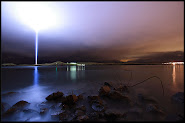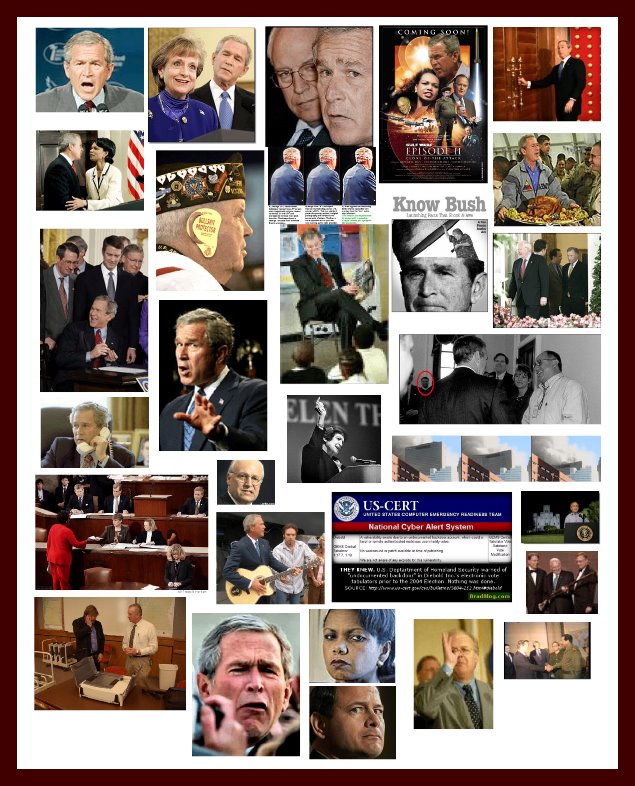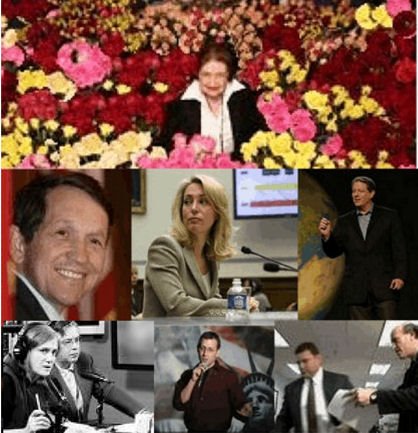Based on the belief that the truth shall set you free:
The Bush/Cheney ‘04 campaign claims to be "Building a Safer World."
Their Convention was in New York City to remind voters of their worst nightmare, to date.
Leading up to the third 9/11 anniversary, Dick Cheney warned Americans of the danger of voting for Kerry: ". . . we'll get hit again and we'll be hit in a way that will be devastating." (Though the sentence was deleted from the web transcript, he made his point.)
Bush and Cheney are banking on voters believing they are the leaders who will keep us safe from terrorists. Polls indicate that is their greatest strength.
However. . .
Across the United States, there are 15,000 chemical manufacturing facilities, oil tank farms, pesticide plants and other repositories of deadly chemicals that are without standard security measures – EASY TO HIT - EASY TO POISON OUR AIR ON A HUGE SCALE. Talk about devastating. .
The Kuehne Chemical Company of Kearney, New Jersey, for example, just across the Hudson from Ground Zero, reported in a 1999 mandatory safety report that a rupture of an onsite tank car, for example, "would be immediately dangerous to life and health for a distance exceeding fourteen miles. The total population in this radius is approximately twelve million."
Troy Morgan, the FBI’s Weapons of Mass Destruction Specialist, refers to such a chemical tank as "the poor man’s atomic bomb."
In April 2002, Pittsburgh Tribune Review reporter, Carl Prine, entered 60 dangerous chemical plants, strolling through unguarded gates, driving up to pipes and control rooms, climbing on tanks – all key terrorist targets. "I wonder what it would take for me to get arrested at one of these plants?"
On February 6, 2002, George Tenet, then Director of the CIA, testified that Al Qaeda could be planning to target chemical facilities.
Unfortunately, Bush is ignoring this warning, because this is where Bush’s stand on deregulation outweighs his concern for keeping us safe.
Attempts to respond to Tenet’s warning, by establishing enforceable security standards at these chemical plants, were shut down when the chemical-industry trade associations put their money and lobbyists to work.
Meanwhile, Christine Whitman at the Environmental Protection Agency spent a year trying to negotiate chemical security regulations that would suit the White House – to no avail. So, she decided to fall back on the EPA’s authority to send inspectors to high priority chemical facilities. Unfortunately, her plans were leaked on June 11, 2002.
Naughty Christine and EPA.
On July 25, 2002, Senator John Corzine’s (D-NJ) Chemical Security Bill, an attachment to the Senate's Homeland Security bill specifically granting the EPA authority to regulate security at plants housing dangerous chemicals, and requiring a decrease in the quantity of dangerous substances allowed in storage, passed the Environment and Public Works Committee on a 19-0 vote.
Naughty EPW Committee.
On August 29, 2002, the Republican members of the Environment and Public Works Committee received a letter, signed by thirty members of the chemical and oil industry lobby, protesting the Chemistry Security Bill.
A week later, on September 6, 2002, the Bush's Council on Environmental Quality (CEQ) received an urgent fax from the President and CEO of The American Petroleum Institute. Days later, on September 11, seven of the nine Republican members of the Environmental and Public Works Committee changed their stand and signed a letter arguing against the Chemical Security Bill. It died without a vote.
That summer, The American Chemistry Council paid more than $1 million in political contributions, most of which went to Republicans.
That fall, Bush, in a reversal of position (flip flop!), suddenly campaigned in favor of the Department of Homeland Security Act, and it passed in November, without any binding provisions for security at chemical plants.
Once the new Department was in place, in early 2003, Bush took away all EPA authority over chemical security and transferred all such oversight to the inexperienced, overwhelmed and underfunded Department of Homeland Security.
On May 21, 2003, Christine Whitman announced her resignation as Chief Administrator of the Environmental Protection Agency.
The American Chemistry Council, the largest chemical industry trade association, has issued a code of voluntary security practices. Sadly, it does not include such basic protections as background checks on guards or even timely repair of fences.
Thus, Bush/Cheney ‘04 sells out our safety when we’re not watching. It should not be considered their strong point.
To verify/research, Google "Bush +EPA +chemical +Homeland."
U.S. Increases Nuclear Energy Spending as It Fights Global Weapons Ban
-
Watch this video:
8 years ago

















No comments:
Post a Comment